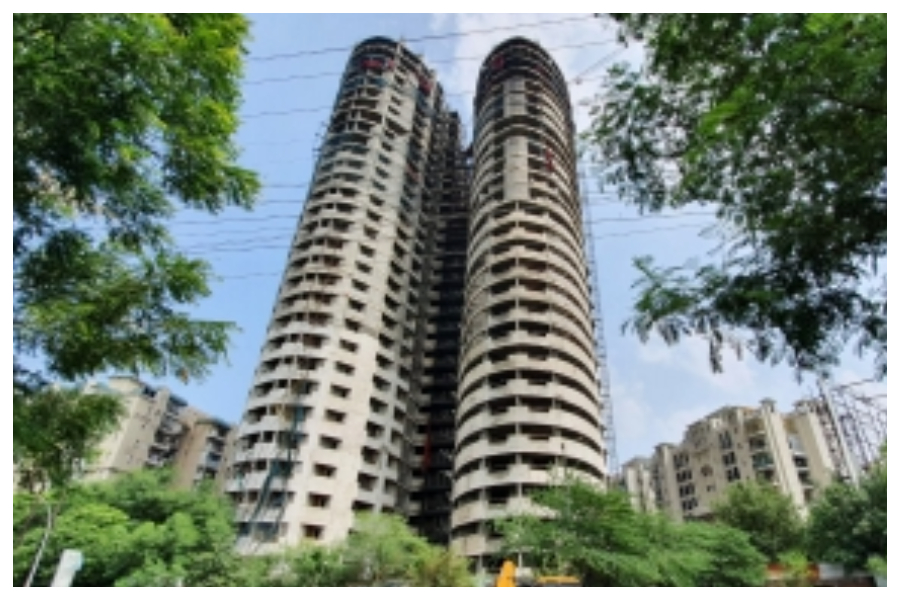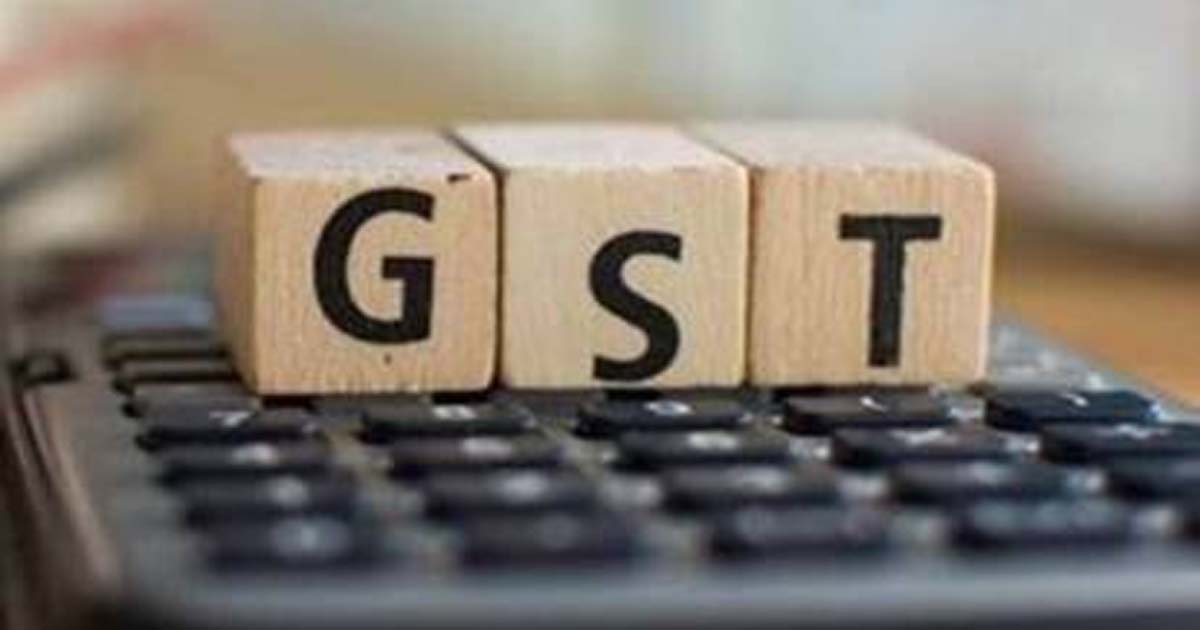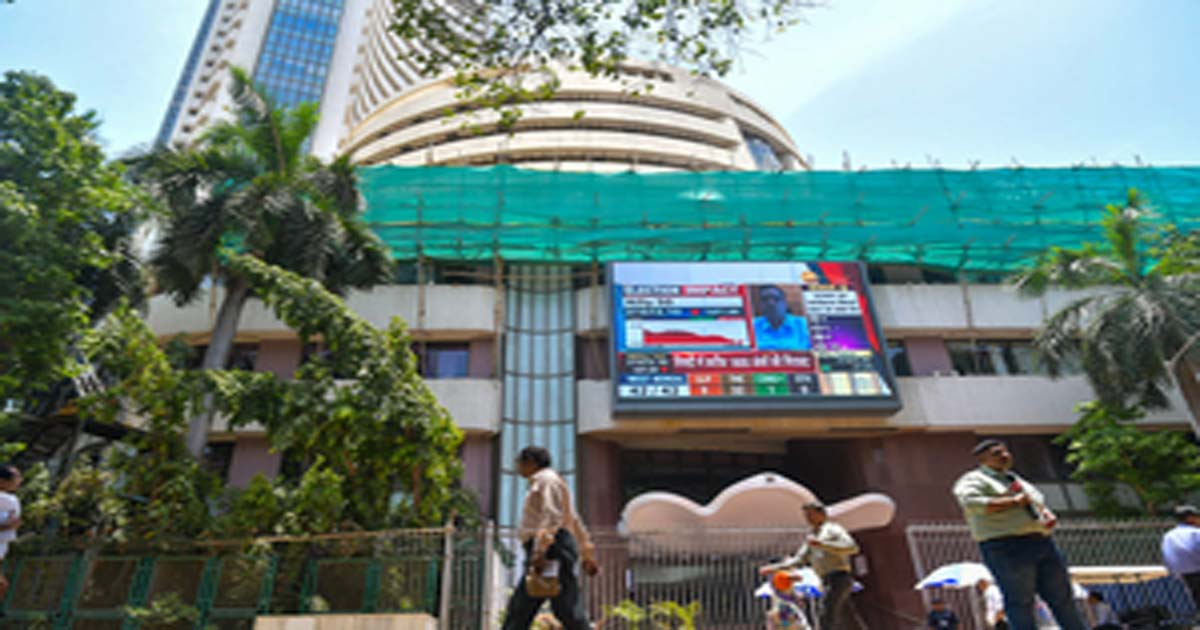Business
Supertech stares at insolvency amid heat of twin-tower demolition

A couple of years ago, real estate firm Supertech Ltd was gaining steam with several thousand apartments in Delhi-NCR.
It advertised extensively and the firm was among the top in the real estate sector. Then in 2020 came the Covid pandemic, which turned everything upside down and created an unprecedented crisis for the real estate industry.
As things begin to normalise, it seems normalcy has reached beyond the reach of Supertech with the company receiving a twofold blow.
First, in August last year, the Supreme Court ordered demolition of its two 40-storey towers in Noida, and in March this year, the National Company Law Tribunal (NCLT) declared Supertech as insolvent while admitting a plea filed by the Union Bank of India (UBI) over non-payment of its dues.
In August 2021, the apex court ordered demolition of the twin towers in Sector 93, Noida, within three months, and also directed that the entire amount of homebuyers should be refunded with 12 per cent interest from the time of booking.
Supertech fought a long and draining legal battle to protect its twin towers — having over 900 flats and 21 shops — against demolition, which had been ordered for violation of building bylaws.
It filed a plea in the apex court seeking to save one tower and partially demolish 224 units in the other to conform with building bylaws. However, in October last year, the top court junked the plea by Supertech seeking extension of time for payment of compensation to homebuyers and demolition of twin towers.
Finally, the fate of its twin towers was sealed on February 7, when the apex court directed the authorities to commence the process for demolition of towers within two weeks.
The Noida authority informed the apex court that the demolition will be completed by May 22, and the debris will be removed by August 22.
The past few of months have been dramatic for the real estate company. In January, the Supreme Court pulled up the realty major for not complying with its orders to demolish the twin towers. The top court warned “its directors will be sent to jail for playing truant with the court”, and also took serious note of the deductions in refund made to the homebuyers.
Another jolt hit Supertech when the NCLT in March approved UBI’s application to begin corporate insolvency resolution process (CIRP) against the realty major for non-payment of around Rs 432 crore worth dues.
Supertech is supposed to deliver nearly 25,000 units to homebuyers in 50 projects, which are spread across Noida, Greater Noida, Yamuna Expressway, Ghaziabad and Gurugram, among other cities.
The NCLT appointed Hitesh Goyal as the Interim Resolution Professional (IRP), superseding the board of Supertech. One of the promoters of Supertech moved the NCLAT, challenging the NCLT order.
Earlier this week, the National Company Law Appellate Tribunal (NCLAT) gave the real estate firm one more opportunity to settle its dispute with the Union Bank of India. The bank took the real estate firm to the insolvency court after it failed to pay its debt since July 2019.
The NCLAT extended its stay over formation of a committee of creditors (COC) to overtake Supertech till May 2, after a counsel for a director of the suspended board of Supertech sought one more chance to present a better proposal before the lender bank.
The Union Bank of India counsel had contended that it has received an offer, but it has been rejected on various grounds. The bank’s counsel said it did not mention paying any upfront amount and the tenure of repayment was 24 months, and insisted that Supertech should come up with a definite upfront payment plan for the dues.
On April 4, the Supreme Court said it will protect the interest of Supertech’s twin-tower homebuyers in the backdrop of the appointment of an IRP in the insolvency proceedings against the real estate firm.
According to a note filed by advocate Gaurav Agarwal, amicus curiae in the matter, NCLT passed an order on March 25, 2022, by which corporate insolvency resolution process (CIRP) has been initiated against Supertech and moratorium under Section 14 of IB Code, 2016, has been declared.
Agarwal urged the top court to consider whether payments to be made to the remaining homebuyers of the twin towers should form part of the resolution process or whether the payments should be made by the company from the funds available (or which may become available in future), i.e., the said payments be kept out of the CIRP process?
Also, in case the payments are part of the CIRP process, will the amounts due to the homebuyers be included as a separate category in the proposed resolution plans so that homebuyers get the refund with interest from the successful resolution applicant?
The top court said it will protect the interest of homebuyers in the Supertech’s twin towers in Noida. It said that homebuyers should file their claims with the IRP and seek response from the IRP on the disbursal of their claims.
A note submitted in the top court by Agarwal said: “As per the information given by Supertech Ltd, out of 711 customers/units, the claims of 652 customers/units are settled/paid. Fifty-nine homebuyers still have to be refunded the amounts. The principal outstanding would be Rs 14.96 crore.”
The apex court is likely to next hear the matter in the first week of May.
Business
Gold and silver bring cheers for investors, 2026 outlook remains strong

Mumbai, Dec 25: In a year marked by heightened global uncertainty, precious metals delivered exceptional returns for investors, with silver emerging as a surprise winner.
Silver prices surged by more than 137 per cent — outperforming gold — which also posted a strong gain of around 68 per cent this year.
With equity markets facing volatility, both metals strengthened their position as preferred safe investment options, but silver clearly outshone all traditional choices.
Gold’s strong performance was supported by geopolitical tensions, inflation concerns, and expectations of interest rate cuts by the US Federal Reserve.
A major driving force behind gold’s rally was steady buying by global central banks. For three consecutive years — 2022, 2023 and 2024 — central banks have purchased more than 1,000 tonnes of gold each year.
Alongside this, global investors continued to invest through gold ETFs, using them as a safe place to park funds.
Big global banks have turned increasingly bullish on gold’s outlook. Goldman Sachs has raised its 2026 year-end gold price target to $4,900 per ounce, citing strong central bank demand and ETF inflows.
Deutsche Bank has also upgraded its outlook, projecting gold prices at $4,450 per ounce in 2026.
Silver’s rally, however, has been driven by more than just safe-haven demand. Strong industrial usage has played a crucial role.
Growing demand from sectors such as solar power, electric vehicles, and electronics has significantly increased silver consumption.
At the same time, supply constraints have tightened the market, pushing prices sharply higher.
This dual role — as a precious metal and an industrial input — has helped silver deliver more than double the returns of gold in 2025.
Looking ahead, experts believe the positive momentum in silver could continue into 2026.
Market specialists say that strong industrial demand, limited supply, and supportive global trends could help silver rise by another 15 to 20 per cent next year.
Some analysts expect that in the first half of 2026 alone, silver may generate an additional 20 to 25 per cent return from current levels, though they advise investors to invest gradually, especially if prices see short-term corrections.
Gold’s outlook also remains positive for 2026. Continued central bank buying, possible US rate cuts, and ongoing geopolitical risks are expected to support prices.
Analysts suggest that keeping an eye on central bank activity — whether they continue buying, hold their reserves, or start selling — will be critical, as their actions often signal future price trends well in advance.
“With uncertainty still dominating the global economic landscape, precious metals are likely to continue playing an important role in investor portfolios, offering a mix of safety and growth potential,” experts stated.
Meanwhile, both metal’s prices climbed to new record highs on the MCX on Wednesday morning, helped by a weak US dollar and expectations that the US Federal Reserve may cut interest rates further.
Gold futures for February rose 0.42 per cent to touch an all-time high of Rs 1,38,469 per 10 grams. Silver futures for March jumped nearly 2 per cent to hit a fresh record of Rs 2,23,742 per kg.
In the global market, gold prices crossed the $4,500 per ounce level for the first time. The rise was driven by strong demand for safe-haven assets as investors expect more interest rate cuts by the US Federal Reserve next year.
Business
GST reforms prove tax moderation can boost revenues: Report

New Delhi, Dec 24: Recent reforms under GST 2.0 show that simplification and tax moderation can coexist with strong revenue growth, a report said on Wednesday, calling for freezing peak tax rates and expanding tax base through technology.
The white paper from Think Change Forum said that recent GST reforms proved wrong the long-held belief that higher tax rates are necessary to boost collections as gross GST collections rose 4.5 per cent (on-year) to Rs 1.95 lakh crore in October 2025.
The report argued that the rise in tax collection validated the principle that in high‑informality economies compliance elasticity outweighs rate elasticity. The report, however, flagged that India’s tax‑to‑GDP ratio of around 17 per cent masks a narrow direct tax base and heavy reliance on regressive indirect levies.
“High taxes — whether direct or indirect — always encourage evasion and corruption. Lower taxes widen the base and improve compliance. GST collections are rising because the economy is formalising — but we must avoid creating a new 40 per cent peak rate that undermines compliance. Ideally, GST should be restricted to just 5 per cent and 18 per cent,” said Yogendra Kapoor, author and public speaker.
The forum called for prioritising freezing peak direct tax rates, expanding the direct tax base through technology, avoiding MRP‑based taxation and completing the GST credit chain in the upcoming Union Budget.
As the compensation cess sunsets, the MRP-based taxation is prone to manipulation in a cash-heavy economy and the government should rely instead on clean, specific duties that are easier to enforce.
The Budget should outline a phased roadmap to bring petroleum, electricity and other excluded inputs under GST to restore tax neutrality and reduce cascading costs for industry, it added.
It also listed other priorities including incentivising productive reinvestment and aggressively curtailing the parallel economy.
“The Budget must strengthen enforcement against smuggling, illicit trade and tax evasion so that non-compliance becomes costlier than compliance and honest taxpayers are no longer penalised,” the report noted.
Business
Sensex, Nifty record mild gains amid positive global cues

SHARE MARKET
Mumbai, Dec 24: Indian benchmark indices made moderate gains early on Wednesday amid positive global cues, as the stock market appears to be in a consolidation phase.
As of 9.30 am, Sensex advanced 105 points, or 0.12 per cent to 85,630 and Nifty gained 40 points, or 0.16 per cent to 26,217.
Main broad-cap indices outperformed benchmark indices in terms of gains, with the Nifty Midcap 100 advanced 0.31 per cent, while the Nifty Smallcap 100 added 0.53 per cent.
Hindalco Industries, Axis Bank and Cipla were among the major gainers in the Nifty Pack, while losers included Tech Mahindra, TCS, Titan Company, Dr Reddy’s Labs and Tata Consumer.
Among sectoral indices on NSE, Media, Metal and Realty were the major gainers — up around 0.82 per cent, 0.58 per cent and 0.78 per cent respectively. Nifty IT was leading losses down 0.49 per cent.
The Nifty could extend its advance toward resistance levels at 26,202 and 26,330, while 26,000 is expected to provide near-term support, said experts.
Analysts said that the market appears to be consolidating upward as CY2025 ends. Strong domestic macros and earnings growth expectations in Q3 and Q4 of FY26 and FY27 will support the market.
The market will be resilient due to domestic inflows and DII buying but FIIs may sell rallies, preventing a sharp breakout. The revival of the AI trade in US might impact sentiments in favour of a ‘non-AI trade’ in markets like India, they added.
An additional Rs 2 lakh crore OMO by the RBI will boost liquidity and lower yields, providing positive momentum to credit growth and bank stocks. The RBI on Tuesday announced a fresh set of steps to inject a large amount of money into the banking system to ease tight liquidity conditions.
Asia-Pacific markets traded flat with a positive bias, with several indexes set to close early in lieu of the Christmas Eve holiday.
In Asian markets, China’s Shanghai index advanced 0.24 per cent, and Shenzhen edged up 0.31 per cent, Japan’s Nikkei added 0.06 per cent, while Hong Kong’s Hang Seng Index gained 0.08 per cent. South Korea’s Kospi added 0.12 per cent.
The US markets ended mostly in the green zone overnight, as Nasdaq advanced 0.57 per cent, the S&P 500 edged up 0.46 per cent, and the Dow moved up 0.16 per cent.
On Tuesday, foreign institutional investors (FIIs) sold equities worth Rs 1,795 crore, while domestic institutional investors (DIIs) were net buyers of equities worth Rs 3,812 crore.
-

 Crime3 years ago
Crime3 years agoClass 10 student jumps to death in Jaipur
-

 Maharashtra1 year ago
Maharashtra1 year agoMumbai Local Train Update: Central Railway’s New Timetable Comes Into Effect; Check Full List Of Revised Timings & Stations
-

 Maharashtra1 year ago
Maharashtra1 year agoMumbai To Go Toll-Free Tonight! Maharashtra Govt Announces Complete Toll Waiver For Light Motor Vehicles At All 5 Entry Points Of City
-

 Maharashtra1 year ago
Maharashtra1 year agoFalse photo of Imtiaz Jaleel’s rally, exposing the fooling conspiracy
-

 National News1 year ago
National News1 year agoMinistry of Railways rolls out Special Drive 4.0 with focus on digitisation, cleanliness, inclusiveness and grievance redressal
-

 Maharashtra1 year ago
Maharashtra1 year agoMaharashtra Elections 2024: Mumbai Metro & BEST Services Extended Till Midnight On Voting Day
-

 National News1 year ago
National News1 year agoJ&K: 4 Jawans Killed, 28 Injured After Bus Carrying BSF Personnel For Poll Duty Falls Into Gorge In Budgam; Terrifying Visuals Surface
-

 Crime1 year ago
Crime1 year agoBaba Siddique Murder: Mumbai Police Unable To Get Lawrence Bishnoi Custody Due To Home Ministry Order, Says Report












